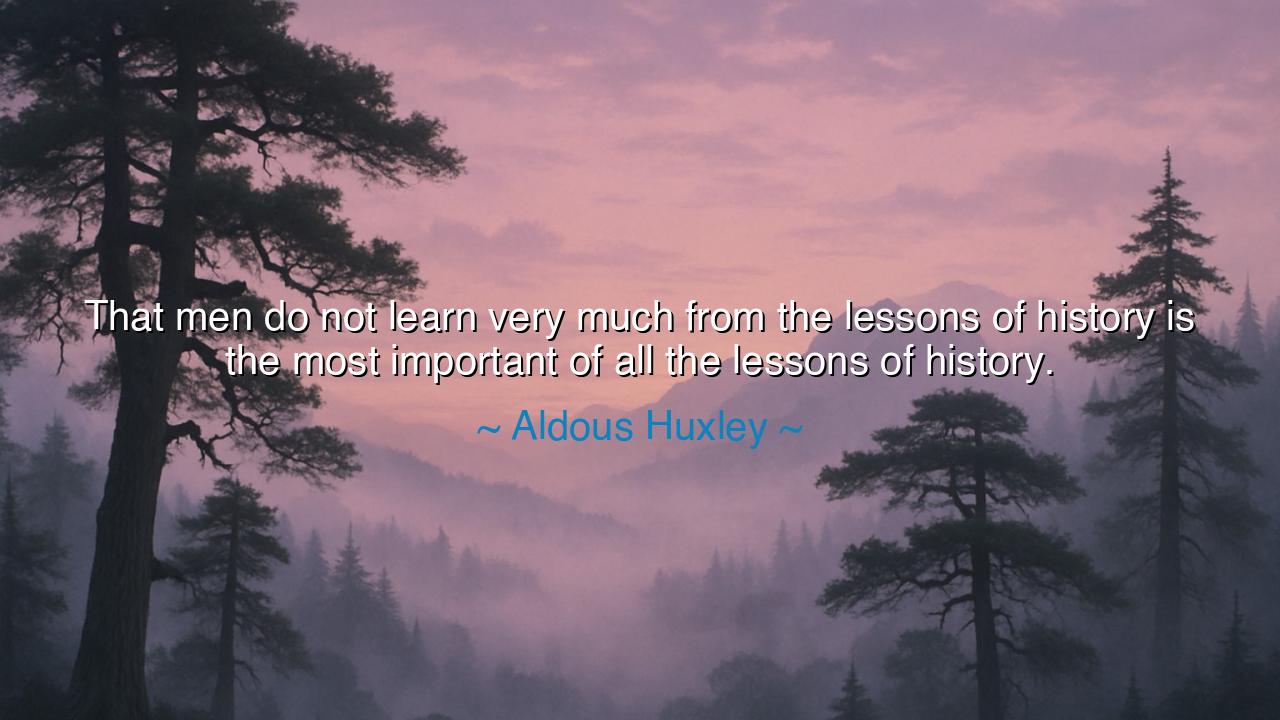
That men do not learn very much from the lessons of history is
That men do not learn very much from the lessons of history is the most important of all the lessons of history.






The philosopher and visionary Aldous Huxley, author of Brave New World, once wrote with sorrowful clarity: “That men do not learn very much from the lessons of history is the most important of all the lessons of history.” In these words lies one of the most haunting truths ever spoken — that humanity, though surrounded by the ruins and revelations of its own past, walks ever forward as though blindfolded. Huxley saw, as few others have, that knowledge alone does not make us wise. The chronicles of empires, the testimonies of suffering, the records of greatness and failure — all stand open before us, yet we repeat the same errors as if we had never read them. His words echo like a warning bell through time, a lament and a challenge: that the cycle of forgetfulness is the oldest curse of mankind.
The origin of this insight lies in Huxley’s lifelong contemplation of civilization and its discontents. Living through the violence of the 20th century — the age of two world wars, the rise of tyrannies, and the mechanization of death — he witnessed how the most “advanced” societies could descend into barbarism under the banners of ideology and pride. He saw nations that prided themselves on reason embrace madness, and peoples who claimed to love peace become agents of destruction. From this he drew his bitter truth: that history, though filled with lessons written in blood, too often fails to instruct, for men remember events but not meanings; they recall victories and defeats, yet forget the causes that gave birth to them.
To understand his wisdom, one need only look to the fall of ancient civilizations. The grandeur of Rome, which once united the known world under its banner, crumbled not from external invasion alone but from within — from corruption, decadence, and the slow decay of virtue. Historians of later ages studied Rome’s collapse, swearing that they would never follow its path. And yet, the empires that rose after — Byzantium, Spain, Britain — each, in turn, succumbed to the same maladies: arrogance, excess, and the blindness of power. The pattern repeats because men remember the facts of history but not its spirit. They seek to inherit its glories, not its wisdom.
The same truth unfolded in Huxley’s own time. After the devastation of World War I, the world swore that such horror would never be repeated. Yet within a single generation, another, greater war erupted — more destructive, more inhuman, more total. The lessons of Versailles, of nationalism, of unchecked power, were all written plainly before the eyes of mankind, yet pride and fear drove humanity once more into catastrophe. When the war was done, millions lay dead, and Huxley saw that the deepest tragedy was not only the loss of life but the failure to learn. He understood that history does not punish ignorance — it punishes forgetfulness.
But Huxley’s words are not meant to despair us; they are meant to awaken us. To learn from history is not merely to study it, but to internalize it — to let its lessons shape the conscience, not just the intellect. It is not enough to know that wars destroy; we must understand why men choose them. It is not enough to admire justice; we must practice it even when it costs us. The true student of history is not the scholar who memorizes dates, but the soul who recognizes patterns of human nature and vows to break them. For the root of all repetition lies not in the past, but in the present heart — in pride, greed, and the failure of empathy.
There is, too, a lesson for each of us as individuals. The same law that governs civilizations governs the soul. A person who repeats the same errors without reflection — who refuses to learn from pain, who blames fate instead of choice — walks the same circular path as the nations that rise and fall. To learn from one’s own history is to become free; to ignore it is to remain enslaved to it. Thus, Huxley’s warning is both cosmic and intimate: that the fate of humanity depends upon the courage of individuals to remember, to reflect, and to change.
So, my listener of the future, take this truth into your spirit: history is a teacher whose lessons are written in the language of consequence. If we fail to read them, they return to us, sharper each time, until we learn or perish. Let us, therefore, honor the memory of the past not with ceremony but with action. Study its patterns; question its silences; recognize in its echoes the voice of your own age. And when the moment of decision comes — whether in the council chamber or the quiet of your own life — choose not the old path of pride and blindness, but the new path of wisdom born of remembrance.
For if Aldous Huxley was right — and he was — then the greatest hope of mankind lies in this: that one generation, someday, will finally learn the lesson that all before it have forgotten. And when that day comes, the cycle will break, and history will at last fulfill its purpose — not as a record of failure, but as the story of our redemption.






AAdministratorAdministrator
Welcome, honored guests. Please leave a comment, we will respond soon